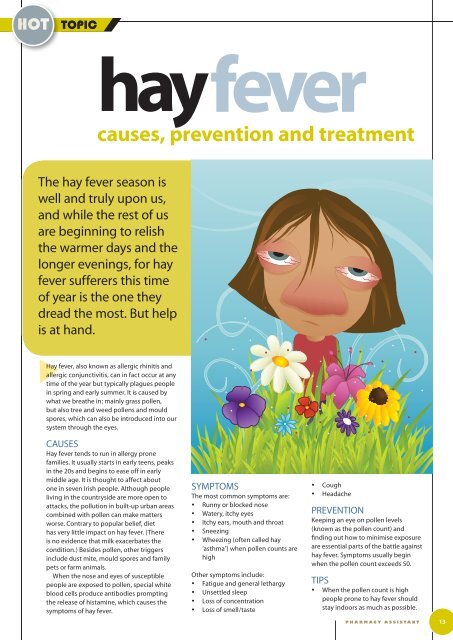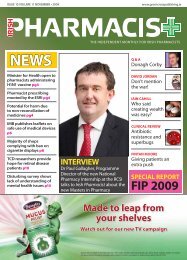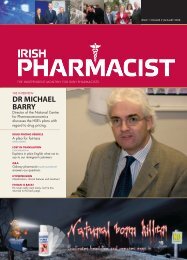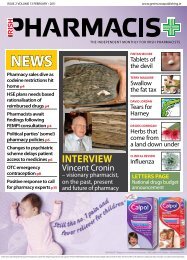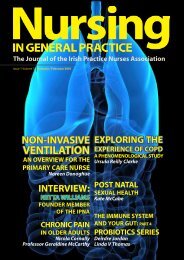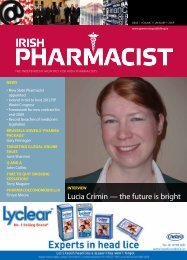Pharmacy Assistant - Green Cross Publishing
Pharmacy Assistant - Green Cross Publishing
Pharmacy Assistant - Green Cross Publishing
You also want an ePaper? Increase the reach of your titles
YUMPU automatically turns print PDFs into web optimized ePapers that Google loves.
HOT<br />
TOPIC<br />
hay<br />
causes, prevention and treatment<br />
The hay fever season is<br />
well and truly upon us,<br />
and while the rest of us<br />
are beginning to relish<br />
the warmer days and the<br />
longer evenings, for hay<br />
fever sufferers this time<br />
of year is the one they<br />
dread the most. But help<br />
is at hand.<br />
Hay fever, also known as allergic rhinitis and<br />
allergic conjunctivitis, can in fact occur at any<br />
time of the year but typically plagues people<br />
in spring and early summer. It is caused by<br />
what we breathe in; mainly grass pollen,<br />
but also tree and weed pollens and mould<br />
spores, which can also be introduced into our<br />
system through the eyes.<br />
causes<br />
Hay fever tends to run in allergy prone<br />
families. It usually starts in early teens, peaks<br />
in the 20s and begins to ease off in early<br />
middle age. It is thought to affect about<br />
one in seven Irish people. although people<br />
living in the countryside are more open to<br />
attacks, the pollution in built-up urban areas<br />
combined with pollen can make matters<br />
worse. contrary to popular belief, diet<br />
has very little impact on hay fever. (There<br />
is no evidence that milk exacerbates the<br />
condition.) Besides pollen, other triggers<br />
include dust mite, mould spores and family<br />
pets or farm animals.<br />
When the nose and eyes of susceptible<br />
people are exposed to pollen, special white<br />
blood cells produce antibodies prompting<br />
the release of histamine, which causes the<br />
symptoms of hay fever.<br />
fever<br />
sympToms<br />
The most common symptoms are:<br />
• Runny or blocked nose<br />
• Watery, itchy eyes<br />
• Itchy ears, mouth and throat<br />
• sneezing<br />
• Wheezing (often called hay<br />
‘asthma’) when pollen counts are<br />
high<br />
other symptoms include:<br />
• Fatigue and general lethargy<br />
• unsettled sleep<br />
• Loss of concentration<br />
• Loss of smell/taste<br />
• cough<br />
• Headache<br />
pRevenTIon<br />
Keeping an eye on pollen levels<br />
(known as the pollen count) and<br />
finding out how to minimise exposure<br />
are essential parts of the battle against<br />
hay fever. symptoms usually begin<br />
when the pollen count exceeds 50.<br />
TIps<br />
• When the pollen count is high<br />
people prone to hay fever should<br />
stay indoors as much as possible.<br />
pharmacy assistant 13


